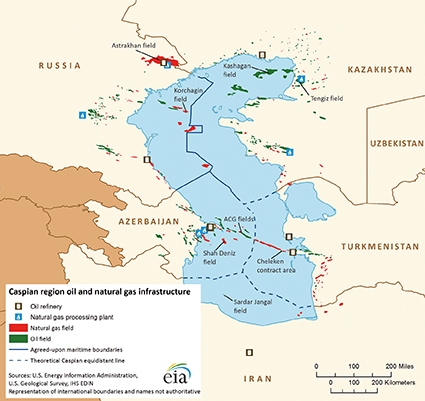Trans-Caspian Pipeline Might Become a Viable Project
Op-Ed
On June 21, the Russian Prime Minister, Dmitry Medvedev, signed a decree which approved the Draft Convention on the legal status of the Caspian Sea. The Caspian basin, beyond the fact that it possesses large amounts of unexplored oil and gas, is important for the South Caucasus as the region itself adjoins the Caspian Sea through Azerbaijan. Therefore, any progress on the legal status might further open new avenues for energy corridors through the South Caucasus to Europe.
The five Caspian littoral states, Russia, Kazakhstan, Turkmenistan, Azerbaijan and Iran, have been debating the issue of the sea’s legal status for the last 16 years. One of the main bones of contention between the five states has been the issue as to whether the Caspian is a sea or a lake. If the Caspian is designated a lake, the so called "condominium" approach would divide the Caspian wealth equally (20% each) among the five littoral states. However, such a designation and division of the Caspian waters would be detrimental to Kazakhstan which has the largest sector of the Caspian Sea and, so far, the largest amount of oil and natural gas.
Iran, with the smallest section on the Caspian, would reap the largest benefits from a "condominium" division of the Caspian Sea. The country has about 13-14% of the Caspian and as yet it appears Iran's section has the least amount of oil and gas. The "Iranian section" also has the highest salt content in the water. This creates additional problems as the extrication of oil and gas would require more expensive technology.
Against this background come the recent reports from major Russian news agencies such as Interfax and TASS, which give details of major provisions in the document. The draft Convention lays out the obligations of the five states as to the use of waters, bottom, subsoil, natural resources and airspace over the sea.
This draft Convention is important as it clarifies the right of the five littoral states to lay underwater pipelines. Article 14 allows the countries to lay underwater cables and pipelines along the bottom of the Caspian Sea, subject only to the agreement of those states whose sectors the pipelines or cables will pass through.
This is of geopolitical importance for the entire region as well as potentially for the energy market of the European continent. Up until that moment, Moscow and Teheran have been against various underwater pipeline projects in the Caspian Sea. Among them the Trans-Caspian Pipeline (TCP) stand out as it would potentially be able to deliver natural gas from Turkmenistan (the world’s fourth largest producer) to Europe.
Georgia would benefit from the TCP as the country would serve as a transit territory. Revenues and the strengthening of the transit potential would enhance Tbilisi’s standing. More importantly, the TCP could challenge Russia’s domination of Europe’s gas market. However, there are crucial challenges to such a large project. First, comes the finances as the project would require at least tens of billions of US dollars. Second, although the draft Convention states that no third states would interfere with the proposed pipelines, still Russia and Iran, which have largest naval capabilities in the Caspian, are unlikely not to undermine the TCP militarily if necessary in the future.
Another important term in the proposed Convention is Article 3, which says that the Caspian Sea is closed to the armed forces of all countries except those of the five littoral states. Here are clearly visible Russia and Iran’s military interests as both fear western encroachment could reach the Caspian region too.
Overall, the Convention is a definite step forward in the security architecture of the Caspian Sea. The document aims at further regulating existing differences between the littoral states on various oil and gas fields in the middle of the sea and claimed simultaneously by two or more countries.
By Emil Avdaliani












